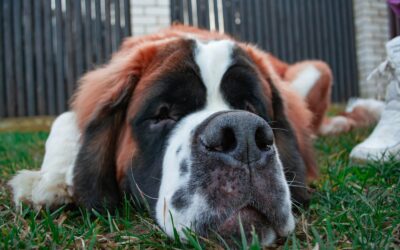How do dogs get kennel cough?
Every dog owner dreads the telltale signs: the dry, hacking cough that seems to come out of nowhere, the occasional gagging, and maybe even a little nasal discharge. No, it isn’t dust allergies or a discomforting hairball – it’s kennel cough.
This common canine illness has a name that’s straightforward enough, hinting at its origin, but it’s surrounded by questions. What is kennel cough, why does it occur, and how can we prevent it in our beloved furry friends? Here’s everything you need to know about kennel cough.
Understanding Kennel Cough In Dogs
Kennel cough, also known as canine infectious tracheobronchitis, is akin to the common cold in humans.
Is kennel cough contagious? It’s a respiratory infection that is highly contagious among dogs. The telltale symptoms of kennel cough are a persistent dry cough, often described as sounding like a honking goose or a seal. Sneezing and a runny nose are common as well. While it’s rarely fatal, kennel cough can be incredibly uncomfortable for dogs.
Kennel cough doesn’t always require treatment beyond rest and fluids, much like a common cold in people. However, for young pups, older dogs, or those with underlying health conditions, kennel cough can lead to complications like pneumonia and require veterinary care.
Kennel cough is named for its ability to spread rapidly in places where dogs congregate, like kennels, dog parks, and grooming salons. It’s caused by a mix of viruses and bacteria, with Bordetella bronchiseptica being a primary culprit.
Dogs can catch kennel cough through airborne droplets from an infected dog’s cough or sneeze, direct contact with an infected dog, or by sharing contaminated objects like water bowls or toys.
Symptoms include a persistent, forceful cough, runny nose, sneezing, lethargy, loss of appetite, and in some cases, a low fever.
While it sounds scary, the good news is that most dogs with robust health will recover without needing serious medical intervention, though it can be uncomfortable for them and worrisome for you. Vaccinations can greatly reduce the risk of your dog contracting kennel cough, making them an essential part of preventative care.
Overall, understanding kennel cough and how to prevent and treat it is crucial for all pet owners to keep their furry friends healthy and happy.
So stay informed, take preventive measures, and don’t hesitate to seek professional help when needed. After all, a healthy dog is a happy dog! Keep your furry friend woofin’ with joy by preventing kennel

Causes of Kennel Cough: How Do Dogs Get Kennel Cough?
Understanding how dogs catch kennel cough and familiarizing yourself with the various organisms that can cause it. Most commonly, it’s a severe infection of both canine adenovirus type 2 and the bacteria Bordetella bronchiseptica. These microorganisms are transmitted through the air, present in the droplets of the coughs and sneezes of infected dogs.
Here’s a deeper dive into the causes of Kennel cough: Kennel cough is ?medically known as infectious tracheobronchitis, arises from a complex interaction of viruses and bacteria, making it a multifactorial disease.
The primary bacterial agent often implicated is Bordetella bronchiseptica, which can alone cause disease or exacerbate the condition when combined with viruses such as the canine adenovirus, canine parainfluenza virus, and canine coronavirus. This respiratory disease is highly contagious among dogs, spreading through airborne particles, direct contact, or contaminated surfaces like toys and water bowls.
Factors contributing to the outbreak of kennel cough include crowded conditions, poor ventilation, cold temperatures, exposure to dust or cigarette smoke, and travel-induced stress, all of which can compromise the respiratory tract’s defenses and facilitate the disease’s spread and development.
Understanding these causative agents and conditions helps in implementing effective prevention and control measures to protect dogs from this distressing condition.
In some cases, kennel cough can be caused by a complex combination of viruses and bacteria, potentially involving parainfluenza virus, reovirus, mycoplasma, and various strains of Bordetella. This diversity in causative agents highlights the challenge of protecting dogs from kennel cough.

Transmission Routes for Kennel Cough: How Do Dogs Get Kennel Cough?
The characteristics of the kennel environment often play a significant role in the transmission of kennel cough. Factors such as stress, overcrowding, and poor ventilation can contribute to the spread of the disease.
Close contact with other dogs is not necessarily required; the illness can spread up to 20 feet, exciting the need for protection in crowded dog parks, grooming facilities, and, of course, kennels.
Another frequent route of kennel cough transmission is through direct contact with contaminated surfaces, which might include water and food bowls, toys, and enclosures. Dog owners need to be vigilant about their pets’ surroundings to minimize the risk of infection.
Preventive Measures and Kennel Cough Vaccine: How Do Dogs Get Kennel Cough?
The good news for proactive pet owners is that there are several preventive measures, including vaccinations, that can reduce the risk of kennel cough. Bordetella vaccines are available in several forms, including an oral vaccine, intranasal vaccines, and injectable vaccines.
These vaccines, in combination with safe hygiene practices, such as regular disinfection of communal spaces for dogs and minimizing their direct contact with possibly infected canines, can significantly reduce the risk of kennel cough.
It’s especially crucial for dog owners to keep current with their vaccines if they board their pets, visit dog parks, or use any service that involves contact with other animals.

Kennel Cough Treatment and Recovery: How Do Dogs Get Kennel Cough?
While prevention is paramount, it’s also important to recognize the signs and treat kennel cough promptly. When a dog shows signs of kennel cough, it’s best to isolate the animal from others to prevent the spread of infection and contact a veterinarian.
The doctor might recommend rest, fluids, and possibly anti-inflammatory medications or cough suppressants to soothe the cough. Antibiotics are not always necessary since kennel cough is often viral, but they are used if there is a secondary bacterial infection, typically involving Bordetella.
Recovery time for kennel cough can vary, but most dogs are back to their usual selves within one to two weeks. In cases where pneumonia or other complications occur, the road to recovery is longer and typically requires more intensive veterinary care.
Kennel Cough versus Other Respiratory Infections: How Do Dogs Get Kennel Cough?
It’s not uncommon for dog owners to confuse kennel cough with other respiratory issues affecting the respiratory tract. One such condition is a reverse sneeze, which, while alarming, is not harmful and is wholly unrelated to kennel cough.
Other more severe diseases, such as canine distemper virus or heart disease, might initially present with symptoms similar to kennel cough.
How is kennel cough diagnosed? It’s essential to see a veterinarian to rule out or diagnose these conditions appropriately.
What Does Kennel Cough Sound like? Ultimately, the distinctive cough associated with kennel cough is what sets it apart. Once you’ve heard it, you won’t easily mistake it for anything else, but it’s always wise to seek professional confirmation and advice.

Debunking the Myth: Kennel Cough Isn’t Just From Kennels: How Do Dogs Get Kennel Cough?
A common misconception about kennel cough is that it’s a disease dogs only pick up in kennels. This is far from the truth. While the name implies a setting-specific condition, the reality is that kennel cough can be contracted in any environment where dogs interact closely with one another.
Dog parks, grooming salons, dog shows, and even a casual encounter during a walk can serve as transmission points.
The disease is airborne, highly contagious, and the pathogens involved can linger on surfaces like toys and water bowls or be spread through direct contact.
It’s important for dog owners to recognize that while kennels can be a hotspot for outbreaks due to the high concentration of dogs, the disease’s reach extends far beyond the walls of any boarding facility. Vaccinations and good hygiene practices are key in protecting our furry friends, regardless of their environment.
The Role of Good Canine Health and Prevention: How Do Dogs Get Kennel Cough?
A robust immune system is a dog’s best defense against kennel cough and other canine infections. Ensuring a balanced diet, regular exercise, and a low-stress environment all contribute to a dog’s overall health and resilience.
Part of maintaining that health includes regular veterinary check-ups, where a professional can provide guidance on vaccinations, nutrition, and any other health-related matters. Kennel cough can be managed effectively with the right care, but prevention and good pet health practices are key to protecting your pooch.

Snouts & Stouts: A Safer Community for Your Dog
It’s common knowledge among dog owners that public dog parks offer little to no regulation over the health and vaccination status of the dogs that enter. This lack of oversight means that dogs, whether vaccinated against Bordetella or showing symptoms of illness, can freely mix and mingle. This situation poses a risk not just of kennel cough but of a variety of infectious diseases that can affect our furry friends.
At Snouts & Stouts, we prioritize the health and safety of all dogs in our community. We understand the concerns that come with the lack of regulation at public dog parks, which is why we have strict policies in place. Every dog that comes through our doors is required to be up to date on all vaccinations, including Bordetella. Furthermore, we diligently screen for any signs of sickness and respectfully do not allow entry to dogs displaying symptoms of illness. Our commitment to these policies ensures a safer, healthier environment for your dog to play, socialize, and thrive, away from the risks present in less regulated settings.
Additional Information on Canine Distemper: How Do Dogs Get Kennel Cough?
Canine Infectious Respiratory Disease Complex (CIRDC), often encapsulated under the term kennel cough, encompasses a broader range of infectious agents than commonly recognized.
This complex includes not only the primary agents like Bordetella bronchiseptica, but also a variety of other bacteria and viruses such as Mycoplasma spp., canine influenza virus, and more. These pathogens can act in concert, creating a compendium of symptoms ranging from mild respiratory discomfort to severe, debilitating conditions.
The transmission of CIRDC follows similar pathways to kennel cough, through airborne particles, direct contact between dogs, or contact with contaminated objects.
Its multifaceted nature makes it a challenging condition to prevent and manage, underscoring the importance of comprehensive vaccination programs, good hygiene practices, and vigilance on the part of pet owners and professionals in canine facilities. Understanding the complex nature of CIRDC is crucial for preventing outbreaks and ensuring the health and well-being of dogs in various social or communal environments.

Conclusion: How Do Dogs Get Kennel Cough?
Kennel cough isn’t something to panic about, but it is a concern for dog owners who want to protect their pets and keep them happy and healthy. It’s a good idea to become familiar with the symptoms and what to do if you suspect your dog has contracted it.
Prevention through vaccinations and good hygiene practices, combined with a healthy lifestyle, will go a long way in keeping kennel cough at bay. Remember, when in doubt, consult your vet. And may your furry friends stay well and woof with joy,




